Critical Review of IFRS Adoption: Australia and Nigeria - HI6025
VerifiedAdded on 2022/09/02
|13
|2170
|23
Report
AI Summary
This report provides a critical review of the adoption of International Financial Reporting Standards (IFRS) in Australia and Nigeria. It begins by highlighting the significance of financial reporting in the accounting profession and the relevance of Positive Accounting Theory (PAT) in predicting financial managers' actions. The report then delves into the reasons behind the adoption of IFRS by both countries, emphasizing the benefits such as improved cross-border transactions and comparability of financial statements. It further examines the transitional issues faced, including the challenges encountered by reporting entities during the adoption process, such as moving from principle-based to rule-based accounting in Australia and the high implementation costs in Nigeria. The report also discusses the benefits of IFRS adoption, including increased transparency, strengthened accountability, and contributions to economic efficiency. It draws comparisons between the two countries, highlighting similarities in their goals and differences in the challenges faced, and assesses the success of IFRS adoption in each country. Finally, the report offers recommendations to accounting standard setting bodies in both countries and concludes by emphasizing the importance of adapting IFRS standards to the present economic conditions.
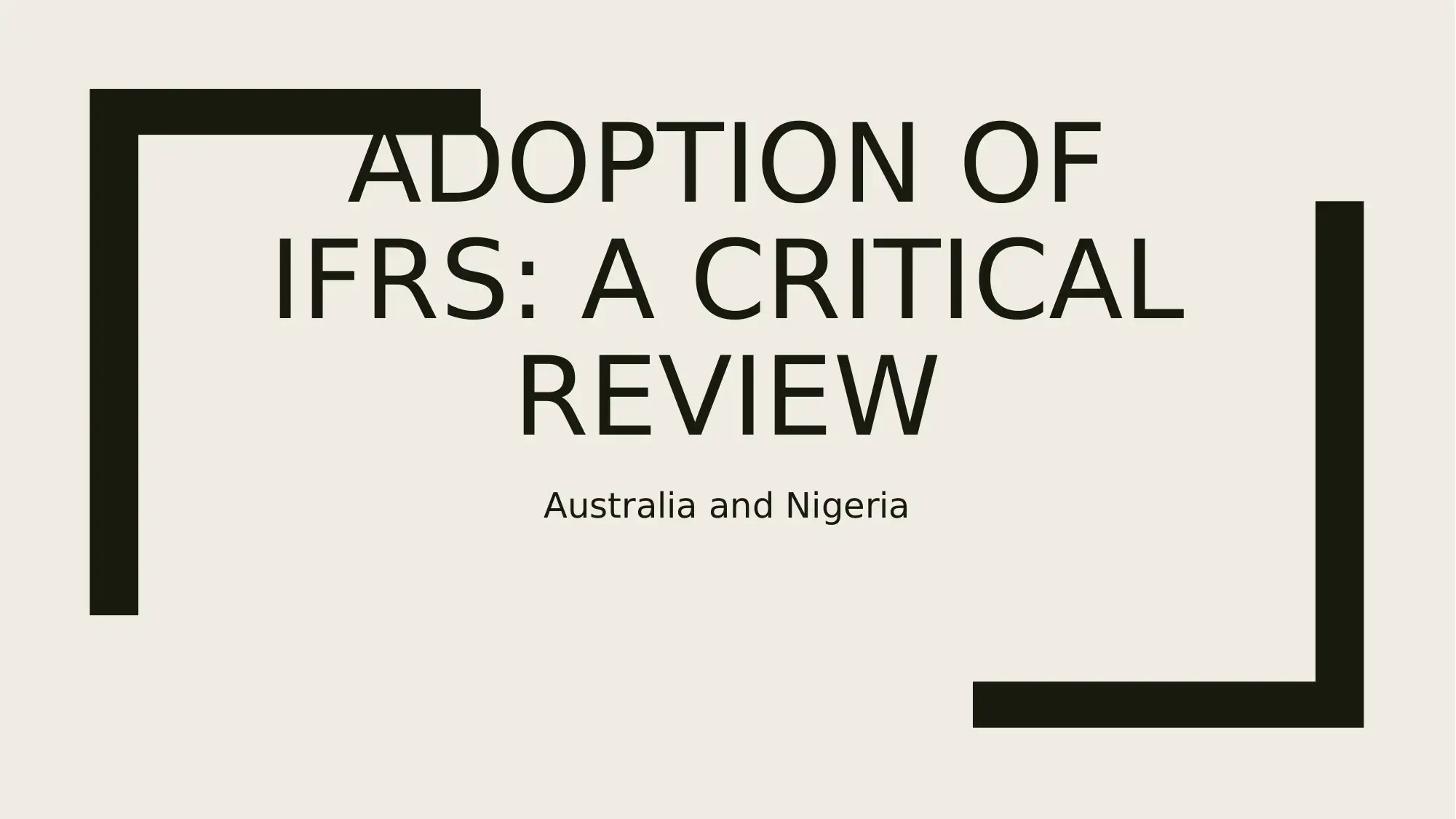
ADOPTION OF
IFRS: A CRITICAL
REVIEW
Australia and Nigeria
IFRS: A CRITICAL
REVIEW
Australia and Nigeria
Paraphrase This Document
Need a fresh take? Get an instant paraphrase of this document with our AI Paraphraser
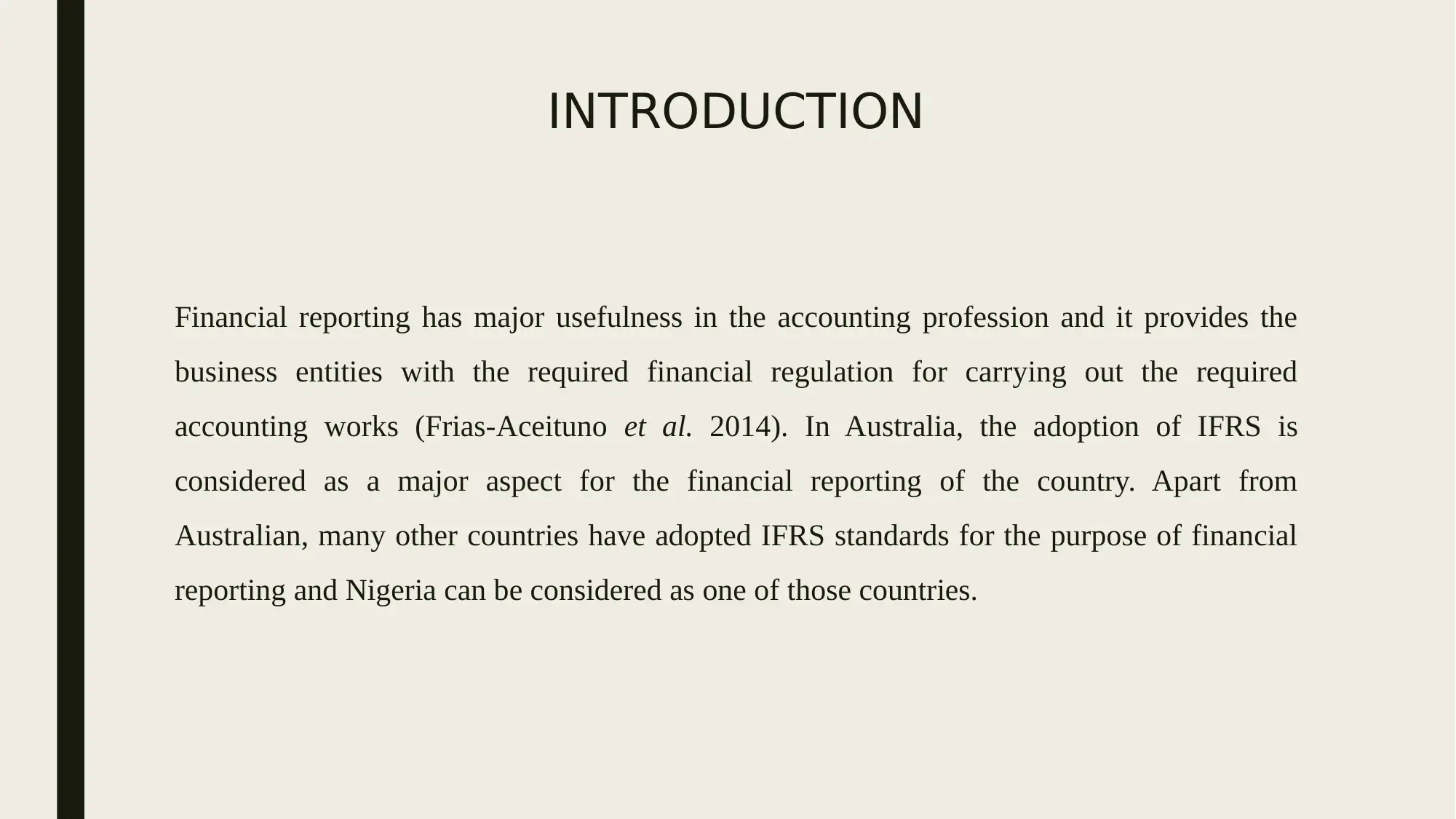
INTRODUCTION
Financial reporting has major usefulness in the accounting profession and it provides the
business entities with the required financial regulation for carrying out the required
accounting works (Frias‐Aceituno et al. 2014). In Australia, the adoption of IFRS is
considered as a major aspect for the financial reporting of the country. Apart from
Australian, many other countries have adopted IFRS standards for the purpose of financial
reporting and Nigeria can be considered as one of those countries.
Financial reporting has major usefulness in the accounting profession and it provides the
business entities with the required financial regulation for carrying out the required
accounting works (Frias‐Aceituno et al. 2014). In Australia, the adoption of IFRS is
considered as a major aspect for the financial reporting of the country. Apart from
Australian, many other countries have adopted IFRS standards for the purpose of financial
reporting and Nigeria can be considered as one of those countries.
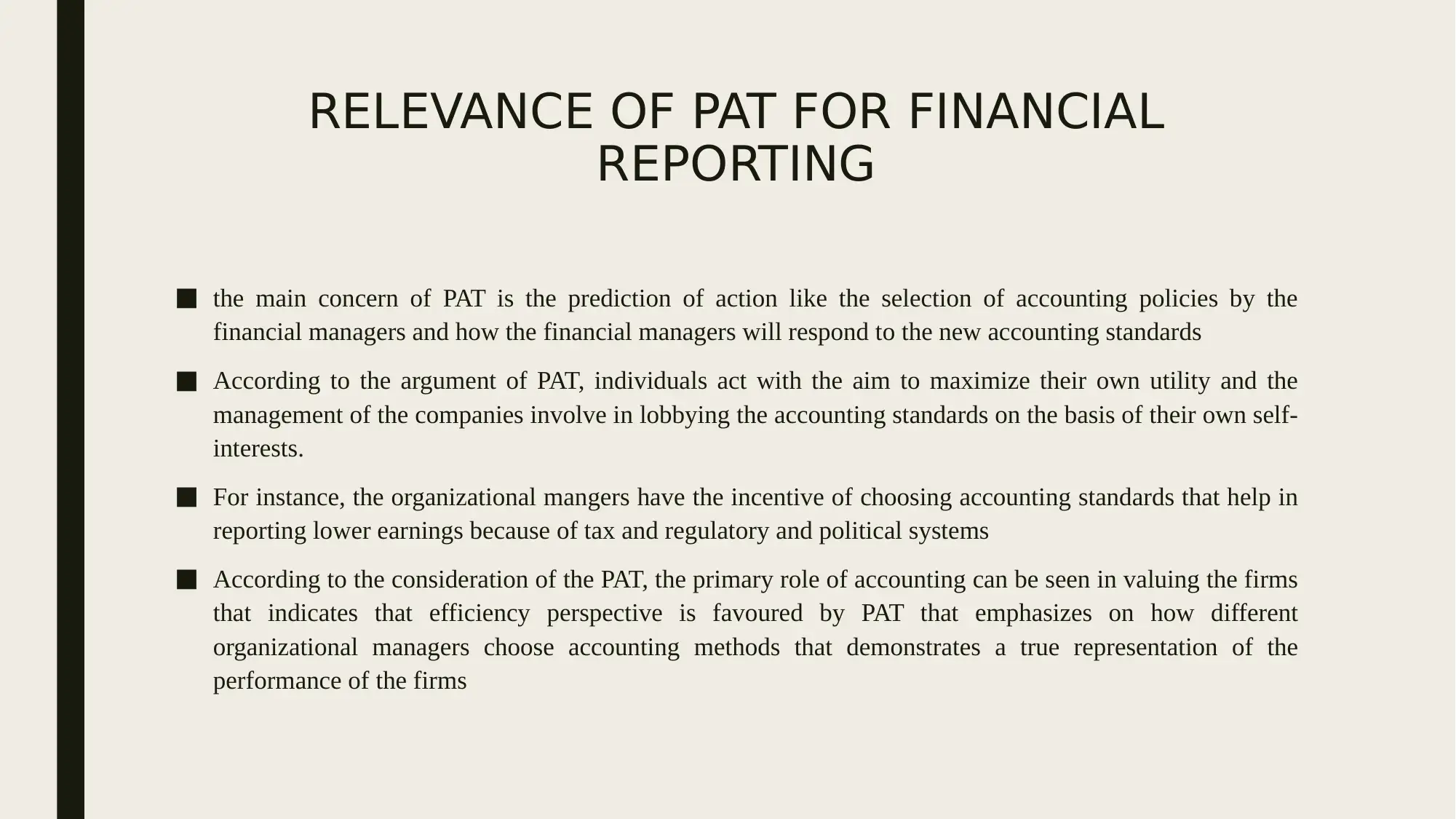
RELEVANCE OF PAT FOR FINANCIAL
REPORTING
■ the main concern of PAT is the prediction of action like the selection of accounting policies by the
financial managers and how the financial managers will respond to the new accounting standards
■ According to the argument of PAT, individuals act with the aim to maximize their own utility and the
management of the companies involve in lobbying the accounting standards on the basis of their own self-
interests.
■ For instance, the organizational mangers have the incentive of choosing accounting standards that help in
reporting lower earnings because of tax and regulatory and political systems
■ According to the consideration of the PAT, the primary role of accounting can be seen in valuing the firms
that indicates that efficiency perspective is favoured by PAT that emphasizes on how different
organizational managers choose accounting methods that demonstrates a true representation of the
performance of the firms
REPORTING
■ the main concern of PAT is the prediction of action like the selection of accounting policies by the
financial managers and how the financial managers will respond to the new accounting standards
■ According to the argument of PAT, individuals act with the aim to maximize their own utility and the
management of the companies involve in lobbying the accounting standards on the basis of their own self-
interests.
■ For instance, the organizational mangers have the incentive of choosing accounting standards that help in
reporting lower earnings because of tax and regulatory and political systems
■ According to the consideration of the PAT, the primary role of accounting can be seen in valuing the firms
that indicates that efficiency perspective is favoured by PAT that emphasizes on how different
organizational managers choose accounting methods that demonstrates a true representation of the
performance of the firms
⊘ This is a preview!⊘
Do you want full access?
Subscribe today to unlock all pages.

Trusted by 1+ million students worldwide
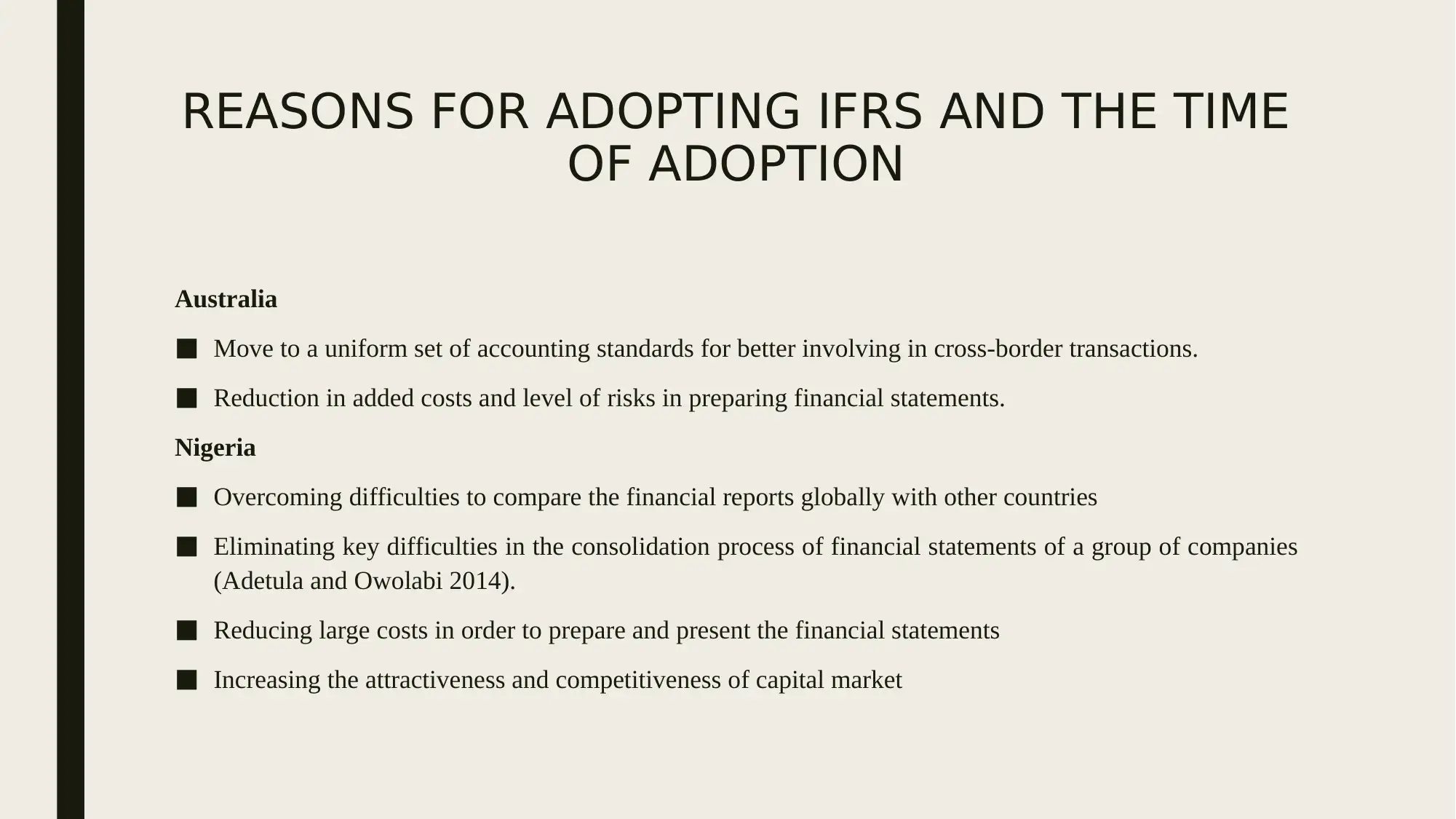
REASONS FOR ADOPTING IFRS AND THE TIME
OF ADOPTION
Australia
■ Move to a uniform set of accounting standards for better involving in cross-border transactions.
■ Reduction in added costs and level of risks in preparing financial statements.
Nigeria
■ Overcoming difficulties to compare the financial reports globally with other countries
■ Eliminating key difficulties in the consolidation process of financial statements of a group of companies
(Adetula and Owolabi 2014).
■ Reducing large costs in order to prepare and present the financial statements
■ Increasing the attractiveness and competitiveness of capital market
OF ADOPTION
Australia
■ Move to a uniform set of accounting standards for better involving in cross-border transactions.
■ Reduction in added costs and level of risks in preparing financial statements.
Nigeria
■ Overcoming difficulties to compare the financial reports globally with other countries
■ Eliminating key difficulties in the consolidation process of financial statements of a group of companies
(Adetula and Owolabi 2014).
■ Reducing large costs in order to prepare and present the financial statements
■ Increasing the attractiveness and competitiveness of capital market
Paraphrase This Document
Need a fresh take? Get an instant paraphrase of this document with our AI Paraphraser
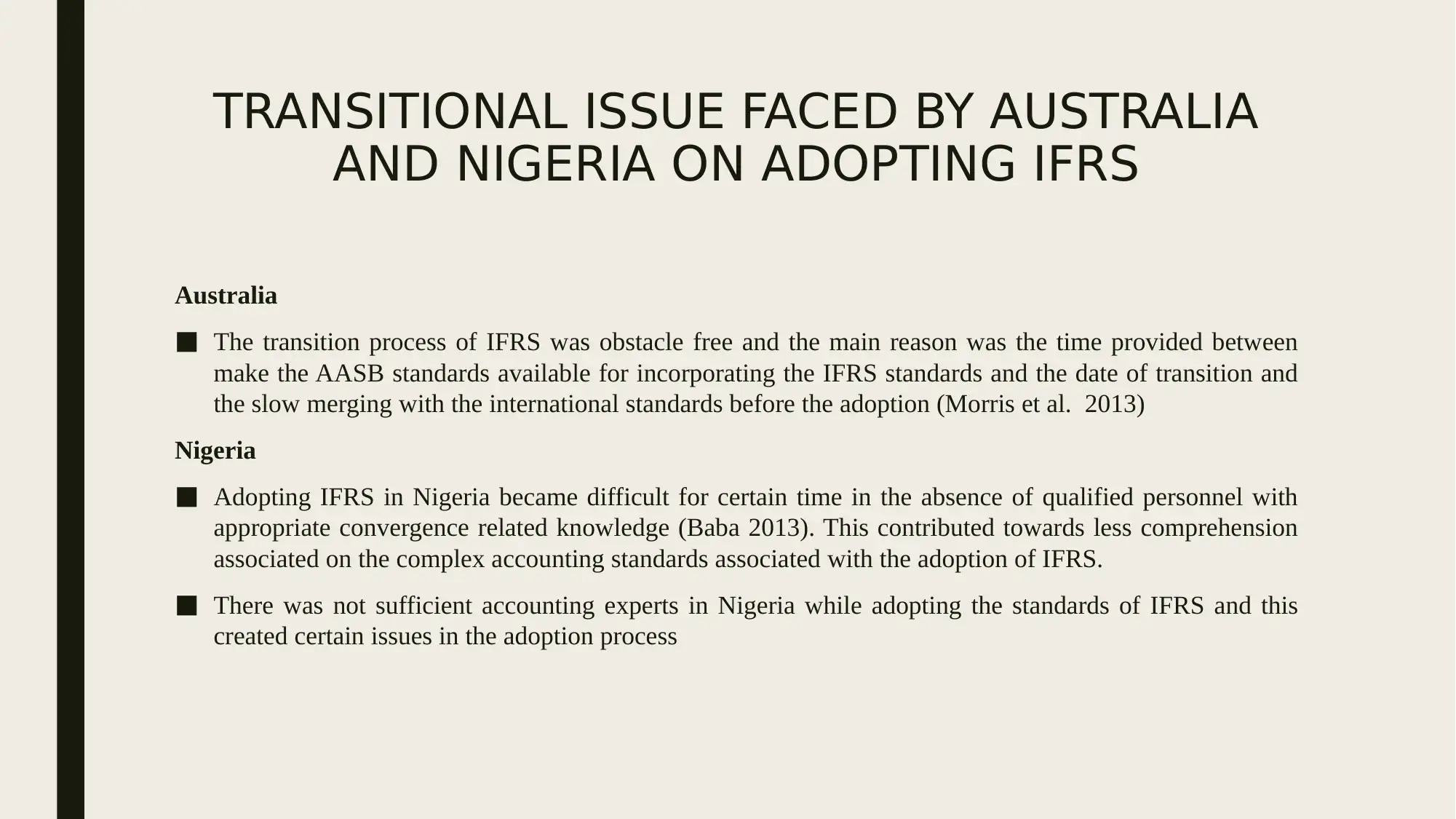
TRANSITIONAL ISSUE FACED BY AUSTRALIA
AND NIGERIA ON ADOPTING IFRS
Australia
■ The transition process of IFRS was obstacle free and the main reason was the time provided between
make the AASB standards available for incorporating the IFRS standards and the date of transition and
the slow merging with the international standards before the adoption (Morris et al. 2013)
Nigeria
■ Adopting IFRS in Nigeria became difficult for certain time in the absence of qualified personnel with
appropriate convergence related knowledge (Baba 2013). This contributed towards less comprehension
associated on the complex accounting standards associated with the adoption of IFRS.
■ There was not sufficient accounting experts in Nigeria while adopting the standards of IFRS and this
created certain issues in the adoption process
AND NIGERIA ON ADOPTING IFRS
Australia
■ The transition process of IFRS was obstacle free and the main reason was the time provided between
make the AASB standards available for incorporating the IFRS standards and the date of transition and
the slow merging with the international standards before the adoption (Morris et al. 2013)
Nigeria
■ Adopting IFRS in Nigeria became difficult for certain time in the absence of qualified personnel with
appropriate convergence related knowledge (Baba 2013). This contributed towards less comprehension
associated on the complex accounting standards associated with the adoption of IFRS.
■ There was not sufficient accounting experts in Nigeria while adopting the standards of IFRS and this
created certain issues in the adoption process
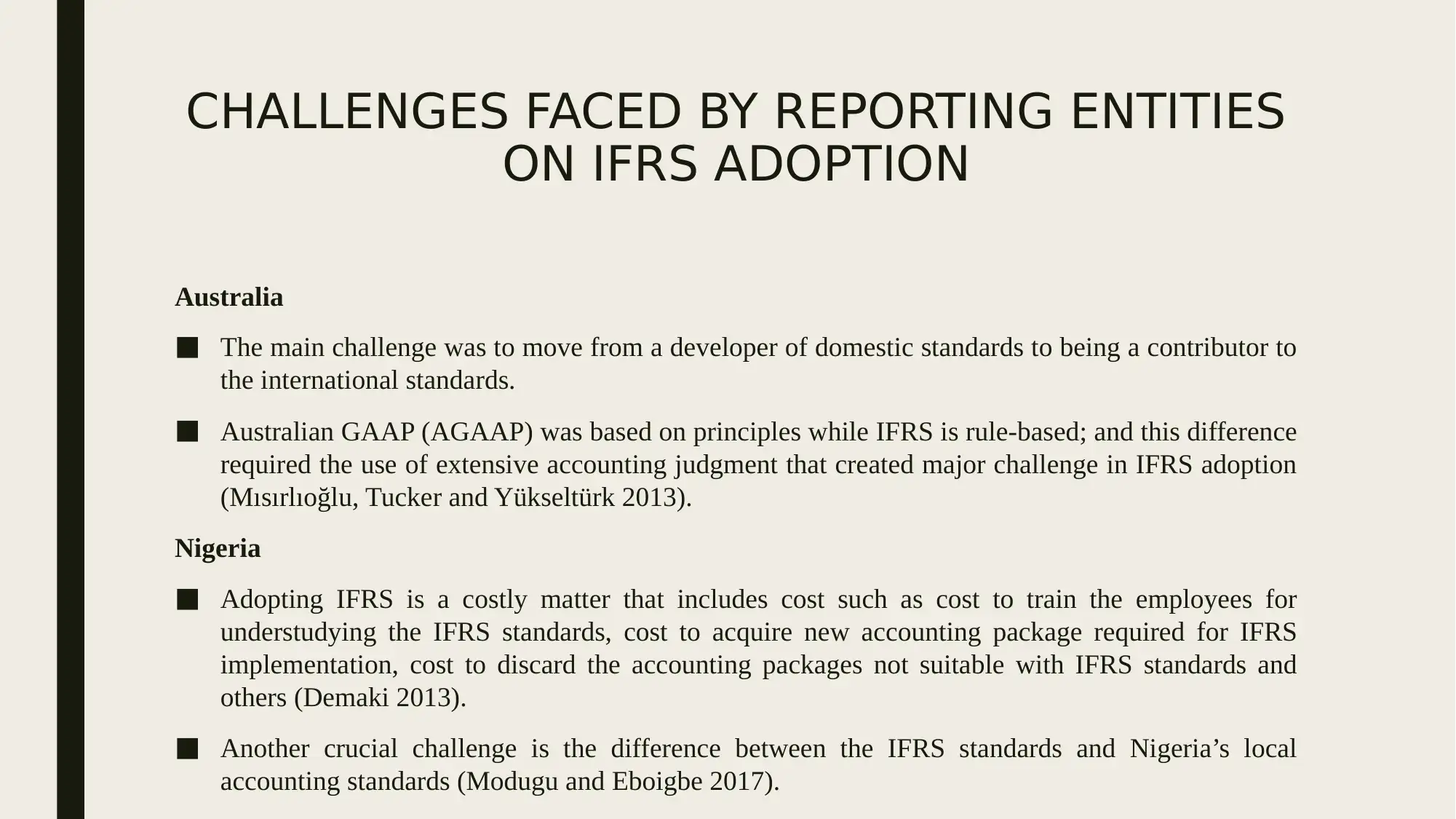
CHALLENGES FACED BY REPORTING ENTITIES
ON IFRS ADOPTION
Australia
■ The main challenge was to move from a developer of domestic standards to being a contributor to
the international standards.
■ Australian GAAP (AGAAP) was based on principles while IFRS is rule-based; and this difference
required the use of extensive accounting judgment that created major challenge in IFRS adoption
(Mısırlıoğlu, Tucker and Yükseltürk 2013).
Nigeria
■ Adopting IFRS is a costly matter that includes cost such as cost to train the employees for
understudying the IFRS standards, cost to acquire new accounting package required for IFRS
implementation, cost to discard the accounting packages not suitable with IFRS standards and
others (Demaki 2013).
■ Another crucial challenge is the difference between the IFRS standards and Nigeria’s local
accounting standards (Modugu and Eboigbe 2017).
ON IFRS ADOPTION
Australia
■ The main challenge was to move from a developer of domestic standards to being a contributor to
the international standards.
■ Australian GAAP (AGAAP) was based on principles while IFRS is rule-based; and this difference
required the use of extensive accounting judgment that created major challenge in IFRS adoption
(Mısırlıoğlu, Tucker and Yükseltürk 2013).
Nigeria
■ Adopting IFRS is a costly matter that includes cost such as cost to train the employees for
understudying the IFRS standards, cost to acquire new accounting package required for IFRS
implementation, cost to discard the accounting packages not suitable with IFRS standards and
others (Demaki 2013).
■ Another crucial challenge is the difference between the IFRS standards and Nigeria’s local
accounting standards (Modugu and Eboigbe 2017).
⊘ This is a preview!⊘
Do you want full access?
Subscribe today to unlock all pages.

Trusted by 1+ million students worldwide
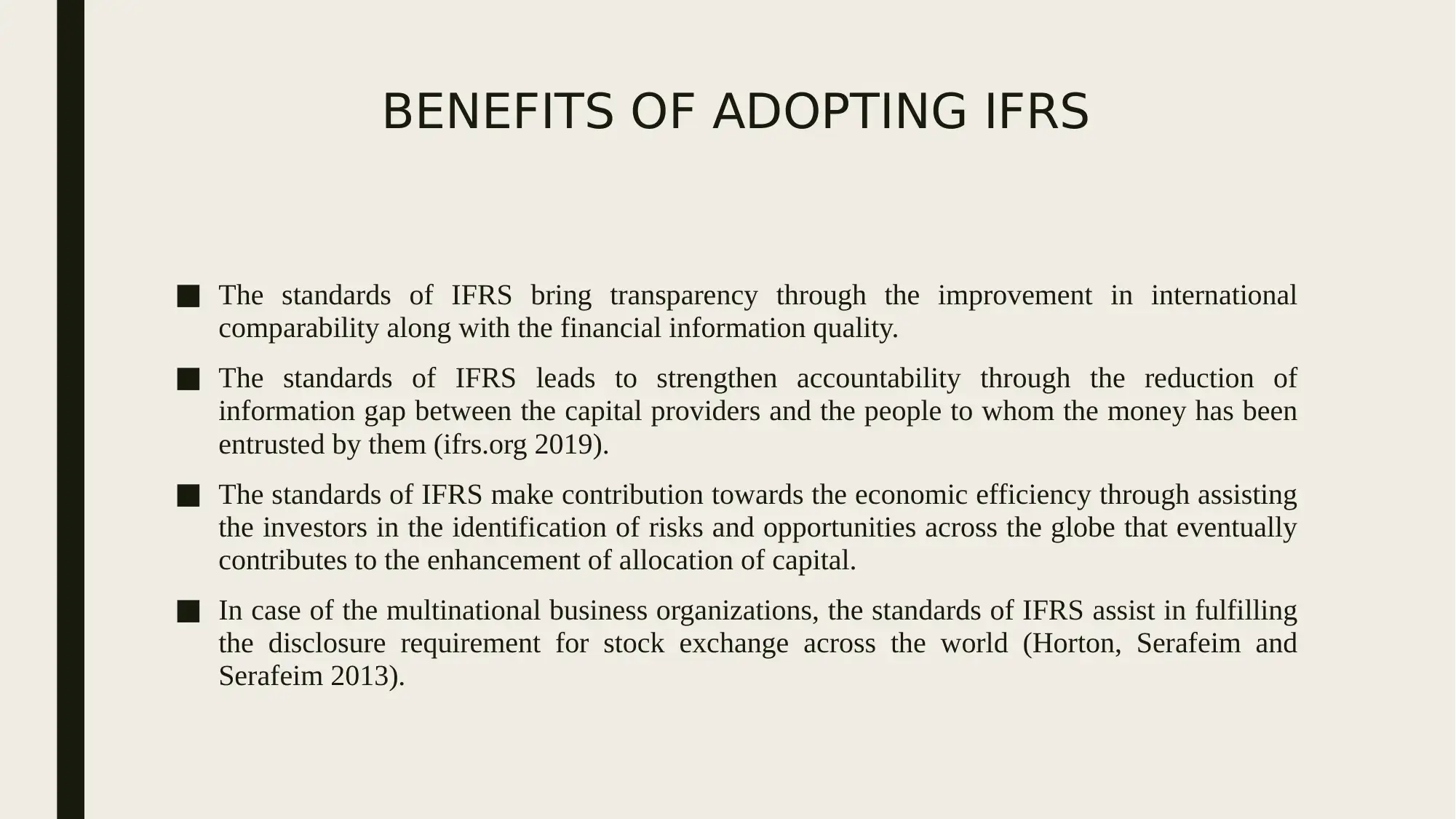
BENEFITS OF ADOPTING IFRS
■ The standards of IFRS bring transparency through the improvement in international
comparability along with the financial information quality.
■ The standards of IFRS leads to strengthen accountability through the reduction of
information gap between the capital providers and the people to whom the money has been
entrusted by them (ifrs.org 2019).
■ The standards of IFRS make contribution towards the economic efficiency through assisting
the investors in the identification of risks and opportunities across the globe that eventually
contributes to the enhancement of allocation of capital.
■ In case of the multinational business organizations, the standards of IFRS assist in fulfilling
the disclosure requirement for stock exchange across the world (Horton, Serafeim and
Serafeim 2013).
■ The standards of IFRS bring transparency through the improvement in international
comparability along with the financial information quality.
■ The standards of IFRS leads to strengthen accountability through the reduction of
information gap between the capital providers and the people to whom the money has been
entrusted by them (ifrs.org 2019).
■ The standards of IFRS make contribution towards the economic efficiency through assisting
the investors in the identification of risks and opportunities across the globe that eventually
contributes to the enhancement of allocation of capital.
■ In case of the multinational business organizations, the standards of IFRS assist in fulfilling
the disclosure requirement for stock exchange across the world (Horton, Serafeim and
Serafeim 2013).
Paraphrase This Document
Need a fresh take? Get an instant paraphrase of this document with our AI Paraphraser
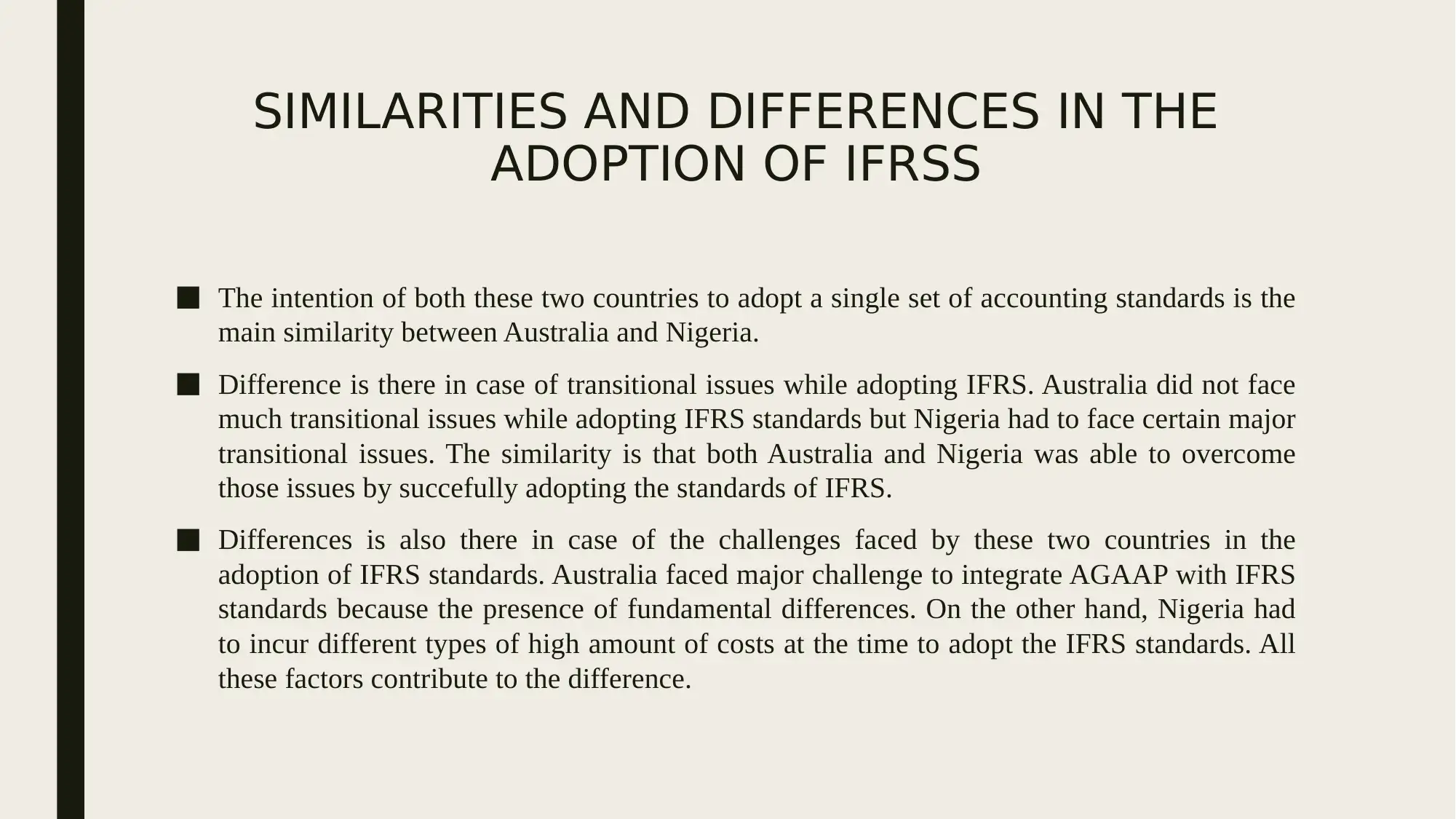
SIMILARITIES AND DIFFERENCES IN THE
ADOPTION OF IFRSS
■ The intention of both these two countries to adopt a single set of accounting standards is the
main similarity between Australia and Nigeria.
■ Difference is there in case of transitional issues while adopting IFRS. Australia did not face
much transitional issues while adopting IFRS standards but Nigeria had to face certain major
transitional issues. The similarity is that both Australia and Nigeria was able to overcome
those issues by succefully adopting the standards of IFRS.
■ Differences is also there in case of the challenges faced by these two countries in the
adoption of IFRS standards. Australia faced major challenge to integrate AGAAP with IFRS
standards because the presence of fundamental differences. On the other hand, Nigeria had
to incur different types of high amount of costs at the time to adopt the IFRS standards. All
these factors contribute to the difference.
ADOPTION OF IFRSS
■ The intention of both these two countries to adopt a single set of accounting standards is the
main similarity between Australia and Nigeria.
■ Difference is there in case of transitional issues while adopting IFRS. Australia did not face
much transitional issues while adopting IFRS standards but Nigeria had to face certain major
transitional issues. The similarity is that both Australia and Nigeria was able to overcome
those issues by succefully adopting the standards of IFRS.
■ Differences is also there in case of the challenges faced by these two countries in the
adoption of IFRS standards. Australia faced major challenge to integrate AGAAP with IFRS
standards because the presence of fundamental differences. On the other hand, Nigeria had
to incur different types of high amount of costs at the time to adopt the IFRS standards. All
these factors contribute to the difference.
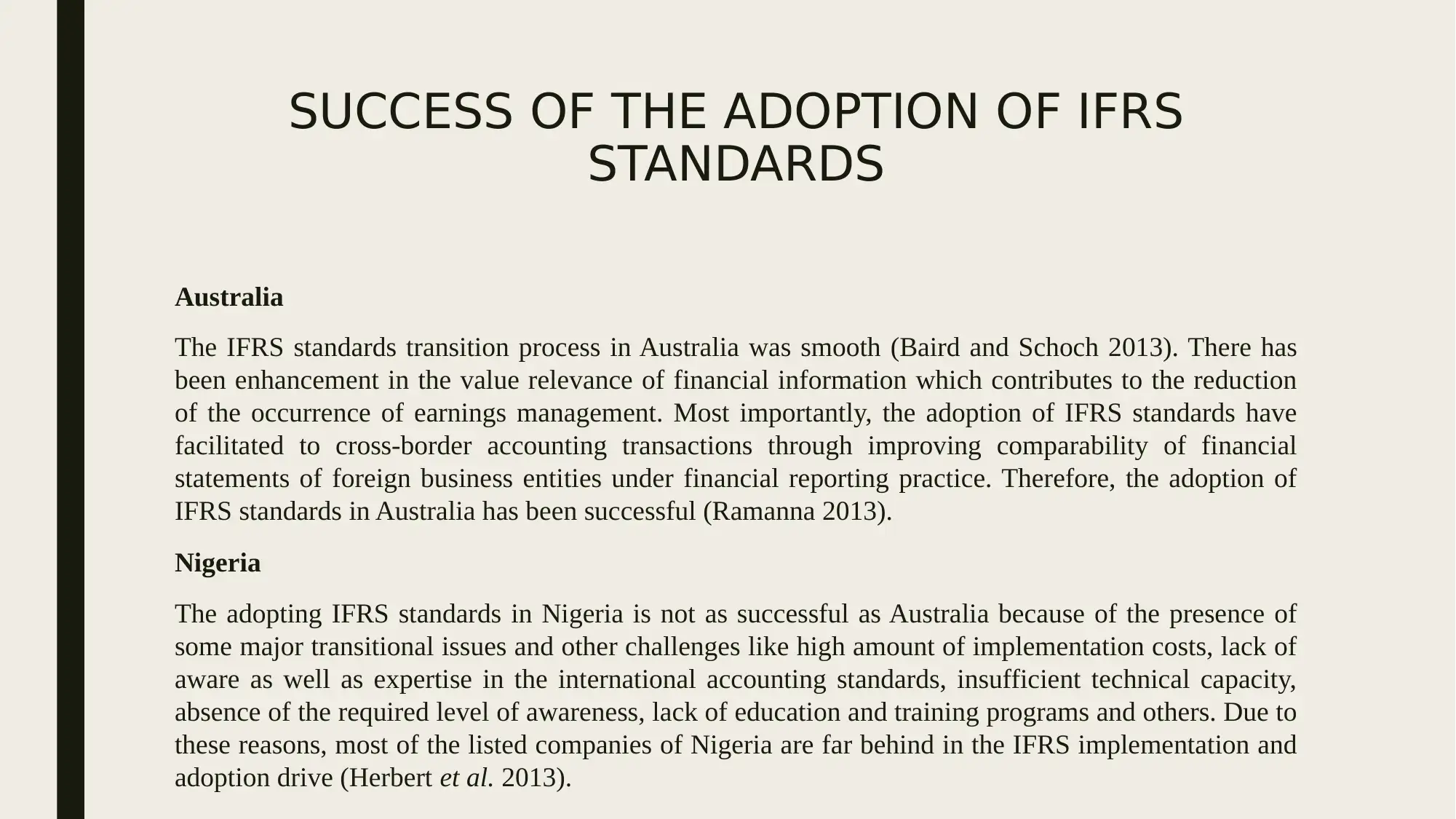
SUCCESS OF THE ADOPTION OF IFRS
STANDARDS
Australia
The IFRS standards transition process in Australia was smooth (Baird and Schoch 2013). There has
been enhancement in the value relevance of financial information which contributes to the reduction
of the occurrence of earnings management. Most importantly, the adoption of IFRS standards have
facilitated to cross-border accounting transactions through improving comparability of financial
statements of foreign business entities under financial reporting practice. Therefore, the adoption of
IFRS standards in Australia has been successful (Ramanna 2013).
Nigeria
The adopting IFRS standards in Nigeria is not as successful as Australia because of the presence of
some major transitional issues and other challenges like high amount of implementation costs, lack of
aware as well as expertise in the international accounting standards, insufficient technical capacity,
absence of the required level of awareness, lack of education and training programs and others. Due to
these reasons, most of the listed companies of Nigeria are far behind in the IFRS implementation and
adoption drive (Herbert et al. 2013).
STANDARDS
Australia
The IFRS standards transition process in Australia was smooth (Baird and Schoch 2013). There has
been enhancement in the value relevance of financial information which contributes to the reduction
of the occurrence of earnings management. Most importantly, the adoption of IFRS standards have
facilitated to cross-border accounting transactions through improving comparability of financial
statements of foreign business entities under financial reporting practice. Therefore, the adoption of
IFRS standards in Australia has been successful (Ramanna 2013).
Nigeria
The adopting IFRS standards in Nigeria is not as successful as Australia because of the presence of
some major transitional issues and other challenges like high amount of implementation costs, lack of
aware as well as expertise in the international accounting standards, insufficient technical capacity,
absence of the required level of awareness, lack of education and training programs and others. Due to
these reasons, most of the listed companies of Nigeria are far behind in the IFRS implementation and
adoption drive (Herbert et al. 2013).
⊘ This is a preview!⊘
Do you want full access?
Subscribe today to unlock all pages.

Trusted by 1+ million students worldwide
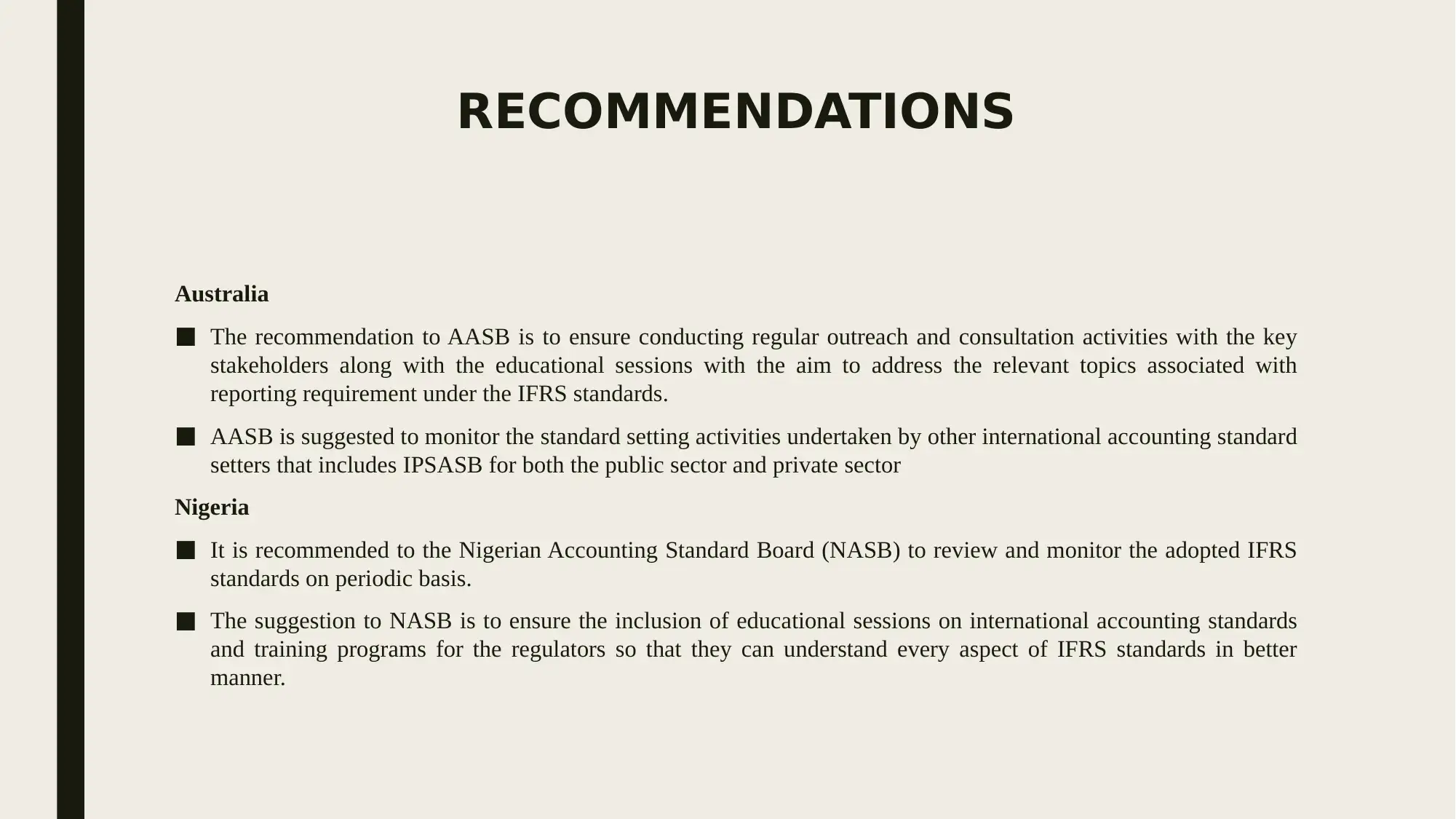
RECOMMENDATIONS
Australia
■ The recommendation to AASB is to ensure conducting regular outreach and consultation activities with the key
stakeholders along with the educational sessions with the aim to address the relevant topics associated with
reporting requirement under the IFRS standards.
■ AASB is suggested to monitor the standard setting activities undertaken by other international accounting standard
setters that includes IPSASB for both the public sector and private sector
Nigeria
■ It is recommended to the Nigerian Accounting Standard Board (NASB) to review and monitor the adopted IFRS
standards on periodic basis.
■ The suggestion to NASB is to ensure the inclusion of educational sessions on international accounting standards
and training programs for the regulators so that they can understand every aspect of IFRS standards in better
manner.
Australia
■ The recommendation to AASB is to ensure conducting regular outreach and consultation activities with the key
stakeholders along with the educational sessions with the aim to address the relevant topics associated with
reporting requirement under the IFRS standards.
■ AASB is suggested to monitor the standard setting activities undertaken by other international accounting standard
setters that includes IPSASB for both the public sector and private sector
Nigeria
■ It is recommended to the Nigerian Accounting Standard Board (NASB) to review and monitor the adopted IFRS
standards on periodic basis.
■ The suggestion to NASB is to ensure the inclusion of educational sessions on international accounting standards
and training programs for the regulators so that they can understand every aspect of IFRS standards in better
manner.
Paraphrase This Document
Need a fresh take? Get an instant paraphrase of this document with our AI Paraphraser
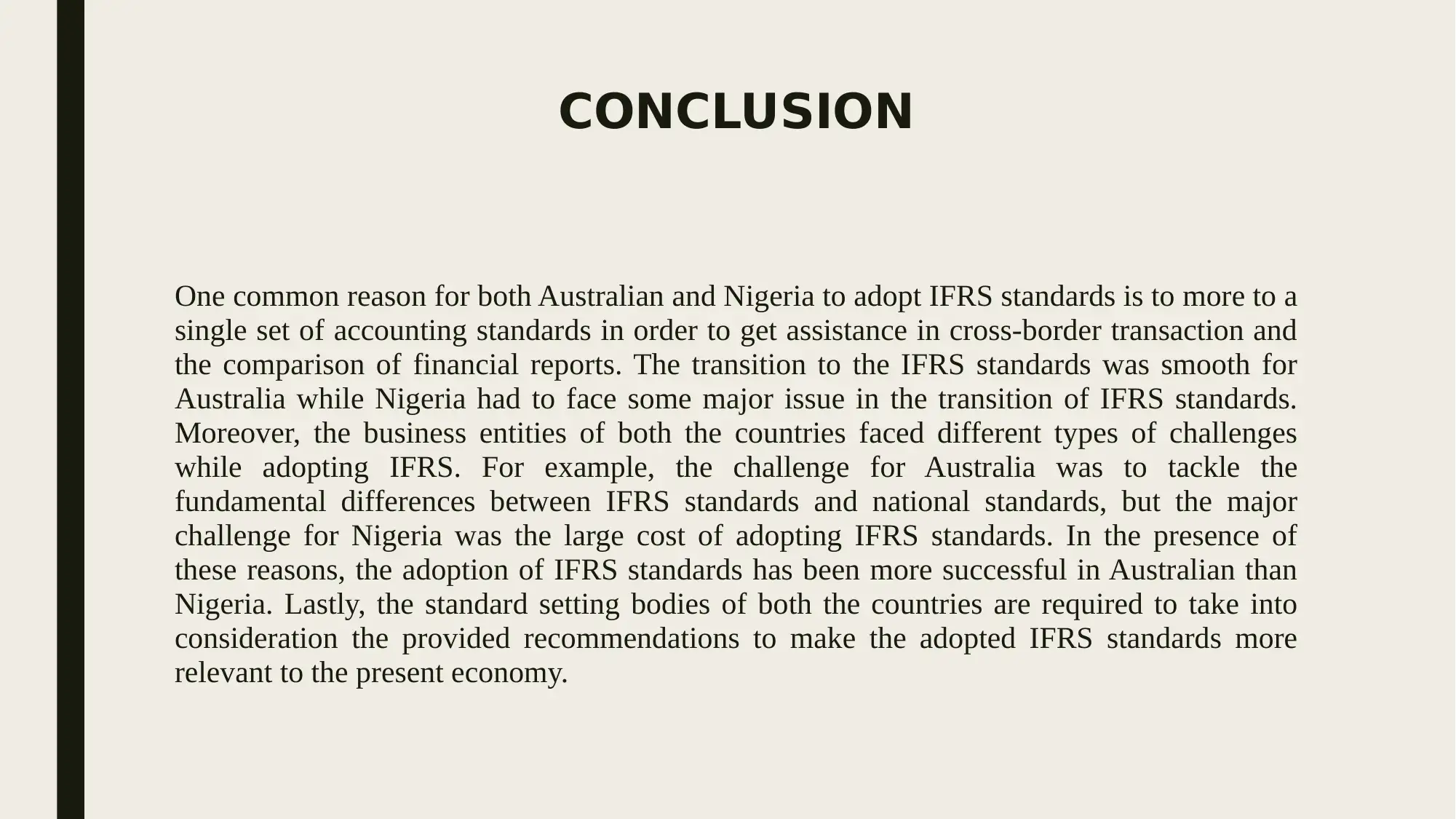
CONCLUSION
One common reason for both Australian and Nigeria to adopt IFRS standards is to more to a
single set of accounting standards in order to get assistance in cross-border transaction and
the comparison of financial reports. The transition to the IFRS standards was smooth for
Australia while Nigeria had to face some major issue in the transition of IFRS standards.
Moreover, the business entities of both the countries faced different types of challenges
while adopting IFRS. For example, the challenge for Australia was to tackle the
fundamental differences between IFRS standards and national standards, but the major
challenge for Nigeria was the large cost of adopting IFRS standards. In the presence of
these reasons, the adoption of IFRS standards has been more successful in Australian than
Nigeria. Lastly, the standard setting bodies of both the countries are required to take into
consideration the provided recommendations to make the adopted IFRS standards more
relevant to the present economy.
One common reason for both Australian and Nigeria to adopt IFRS standards is to more to a
single set of accounting standards in order to get assistance in cross-border transaction and
the comparison of financial reports. The transition to the IFRS standards was smooth for
Australia while Nigeria had to face some major issue in the transition of IFRS standards.
Moreover, the business entities of both the countries faced different types of challenges
while adopting IFRS. For example, the challenge for Australia was to tackle the
fundamental differences between IFRS standards and national standards, but the major
challenge for Nigeria was the large cost of adopting IFRS standards. In the presence of
these reasons, the adoption of IFRS standards has been more successful in Australian than
Nigeria. Lastly, the standard setting bodies of both the countries are required to take into
consideration the provided recommendations to make the adopted IFRS standards more
relevant to the present economy.
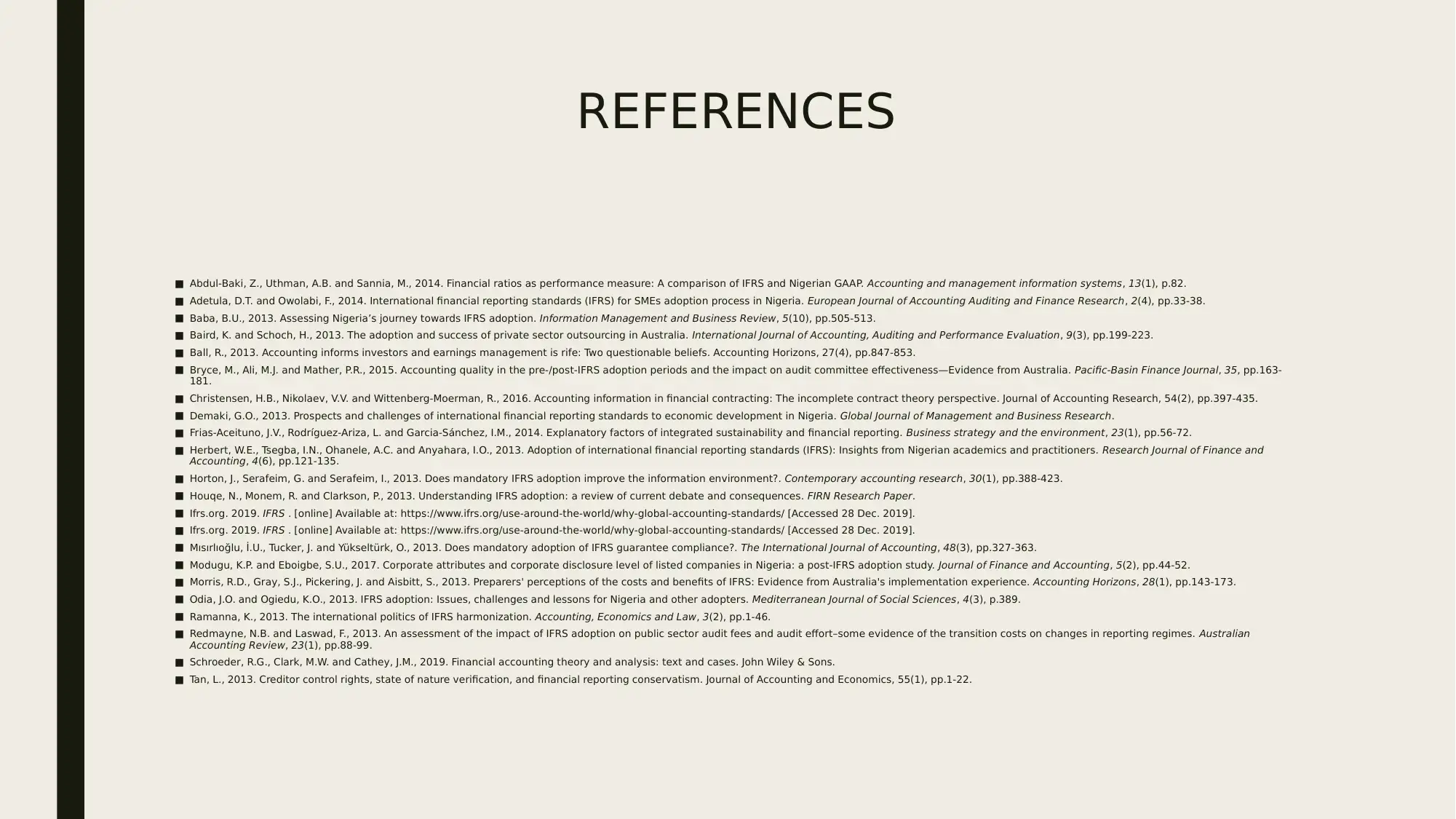
REFERENCES
■ Abdul-Baki, Z., Uthman, A.B. and Sannia, M., 2014. Financial ratios as performance measure: A comparison of IFRS and Nigerian GAAP. Accounting and management information systems, 13(1), p.82.
■ Adetula, D.T. and Owolabi, F., 2014. International financial reporting standards (IFRS) for SMEs adoption process in Nigeria. European Journal of Accounting Auditing and Finance Research, 2(4), pp.33-38.
■ Baba, B.U., 2013. Assessing Nigeria’s journey towards IFRS adoption. Information Management and Business Review, 5(10), pp.505-513.
■ Baird, K. and Schoch, H., 2013. The adoption and success of private sector outsourcing in Australia. International Journal of Accounting, Auditing and Performance Evaluation, 9(3), pp.199-223.
■ Ball, R., 2013. Accounting informs investors and earnings management is rife: Two questionable beliefs. Accounting Horizons, 27(4), pp.847-853.
■ Bryce, M., Ali, M.J. and Mather, P.R., 2015. Accounting quality in the pre-/post-IFRS adoption periods and the impact on audit committee effectiveness—Evidence from Australia. Pacific-Basin Finance Journal, 35, pp.163-
181.
■ Christensen, H.B., Nikolaev, V.V. and Wittenberg‐Moerman, R., 2016. Accounting information in financial contracting: The incomplete contract theory perspective. Journal of Accounting Research, 54(2), pp.397-435.
■ Demaki, G.O., 2013. Prospects and challenges of international financial reporting standards to economic development in Nigeria. Global Journal of Management and Business Research.
■ Frias‐Aceituno, J.V., Rodríguez‐Ariza, L. and Garcia‐Sánchez, I.M., 2014. Explanatory factors of integrated sustainability and financial reporting. Business strategy and the environment, 23(1), pp.56-72.
■ Herbert, W.E., Tsegba, I.N., Ohanele, A.C. and Anyahara, I.O., 2013. Adoption of international financial reporting standards (IFRS): Insights from Nigerian academics and practitioners. Research Journal of Finance and
Accounting, 4(6), pp.121-135.
■ Horton, J., Serafeim, G. and Serafeim, I., 2013. Does mandatory IFRS adoption improve the information environment?. Contemporary accounting research, 30(1), pp.388-423.
■ Houqe, N., Monem, R. and Clarkson, P., 2013. Understanding IFRS adoption: a review of current debate and consequences. FIRN Research Paper.
■ Ifrs.org. 2019. IFRS . [online] Available at: https://www.ifrs.org/use-around-the-world/why-global-accounting-standards/ [Accessed 28 Dec. 2019].
■ Ifrs.org. 2019. IFRS . [online] Available at: https://www.ifrs.org/use-around-the-world/why-global-accounting-standards/ [Accessed 28 Dec. 2019].
■ Mısırlıoğlu, İ.U., Tucker, J. and Yükseltürk, O., 2013. Does mandatory adoption of IFRS guarantee compliance?. The International Journal of Accounting, 48(3), pp.327-363.
■ Modugu, K.P. and Eboigbe, S.U., 2017. Corporate attributes and corporate disclosure level of listed companies in Nigeria: a post-IFRS adoption study. Journal of Finance and Accounting, 5(2), pp.44-52.
■ Morris, R.D., Gray, S.J., Pickering, J. and Aisbitt, S., 2013. Preparers' perceptions of the costs and benefits of IFRS: Evidence from Australia's implementation experience. Accounting Horizons, 28(1), pp.143-173.
■ Odia, J.O. and Ogiedu, K.O., 2013. IFRS adoption: Issues, challenges and lessons for Nigeria and other adopters. Mediterranean Journal of Social Sciences, 4(3), p.389.
■ Ramanna, K., 2013. The international politics of IFRS harmonization. Accounting, Economics and Law, 3(2), pp.1-46.
■ Redmayne, N.B. and Laswad, F., 2013. An assessment of the impact of IFRS adoption on public sector audit fees and audit effort–some evidence of the transition costs on changes in reporting regimes. Australian
Accounting Review, 23(1), pp.88-99.
■ Schroeder, R.G., Clark, M.W. and Cathey, J.M., 2019. Financial accounting theory and analysis: text and cases. John Wiley & Sons.
■ Tan, L., 2013. Creditor control rights, state of nature verification, and financial reporting conservatism. Journal of Accounting and Economics, 55(1), pp.1-22.
■ Abdul-Baki, Z., Uthman, A.B. and Sannia, M., 2014. Financial ratios as performance measure: A comparison of IFRS and Nigerian GAAP. Accounting and management information systems, 13(1), p.82.
■ Adetula, D.T. and Owolabi, F., 2014. International financial reporting standards (IFRS) for SMEs adoption process in Nigeria. European Journal of Accounting Auditing and Finance Research, 2(4), pp.33-38.
■ Baba, B.U., 2013. Assessing Nigeria’s journey towards IFRS adoption. Information Management and Business Review, 5(10), pp.505-513.
■ Baird, K. and Schoch, H., 2013. The adoption and success of private sector outsourcing in Australia. International Journal of Accounting, Auditing and Performance Evaluation, 9(3), pp.199-223.
■ Ball, R., 2013. Accounting informs investors and earnings management is rife: Two questionable beliefs. Accounting Horizons, 27(4), pp.847-853.
■ Bryce, M., Ali, M.J. and Mather, P.R., 2015. Accounting quality in the pre-/post-IFRS adoption periods and the impact on audit committee effectiveness—Evidence from Australia. Pacific-Basin Finance Journal, 35, pp.163-
181.
■ Christensen, H.B., Nikolaev, V.V. and Wittenberg‐Moerman, R., 2016. Accounting information in financial contracting: The incomplete contract theory perspective. Journal of Accounting Research, 54(2), pp.397-435.
■ Demaki, G.O., 2013. Prospects and challenges of international financial reporting standards to economic development in Nigeria. Global Journal of Management and Business Research.
■ Frias‐Aceituno, J.V., Rodríguez‐Ariza, L. and Garcia‐Sánchez, I.M., 2014. Explanatory factors of integrated sustainability and financial reporting. Business strategy and the environment, 23(1), pp.56-72.
■ Herbert, W.E., Tsegba, I.N., Ohanele, A.C. and Anyahara, I.O., 2013. Adoption of international financial reporting standards (IFRS): Insights from Nigerian academics and practitioners. Research Journal of Finance and
Accounting, 4(6), pp.121-135.
■ Horton, J., Serafeim, G. and Serafeim, I., 2013. Does mandatory IFRS adoption improve the information environment?. Contemporary accounting research, 30(1), pp.388-423.
■ Houqe, N., Monem, R. and Clarkson, P., 2013. Understanding IFRS adoption: a review of current debate and consequences. FIRN Research Paper.
■ Ifrs.org. 2019. IFRS . [online] Available at: https://www.ifrs.org/use-around-the-world/why-global-accounting-standards/ [Accessed 28 Dec. 2019].
■ Ifrs.org. 2019. IFRS . [online] Available at: https://www.ifrs.org/use-around-the-world/why-global-accounting-standards/ [Accessed 28 Dec. 2019].
■ Mısırlıoğlu, İ.U., Tucker, J. and Yükseltürk, O., 2013. Does mandatory adoption of IFRS guarantee compliance?. The International Journal of Accounting, 48(3), pp.327-363.
■ Modugu, K.P. and Eboigbe, S.U., 2017. Corporate attributes and corporate disclosure level of listed companies in Nigeria: a post-IFRS adoption study. Journal of Finance and Accounting, 5(2), pp.44-52.
■ Morris, R.D., Gray, S.J., Pickering, J. and Aisbitt, S., 2013. Preparers' perceptions of the costs and benefits of IFRS: Evidence from Australia's implementation experience. Accounting Horizons, 28(1), pp.143-173.
■ Odia, J.O. and Ogiedu, K.O., 2013. IFRS adoption: Issues, challenges and lessons for Nigeria and other adopters. Mediterranean Journal of Social Sciences, 4(3), p.389.
■ Ramanna, K., 2013. The international politics of IFRS harmonization. Accounting, Economics and Law, 3(2), pp.1-46.
■ Redmayne, N.B. and Laswad, F., 2013. An assessment of the impact of IFRS adoption on public sector audit fees and audit effort–some evidence of the transition costs on changes in reporting regimes. Australian
Accounting Review, 23(1), pp.88-99.
■ Schroeder, R.G., Clark, M.W. and Cathey, J.M., 2019. Financial accounting theory and analysis: text and cases. John Wiley & Sons.
■ Tan, L., 2013. Creditor control rights, state of nature verification, and financial reporting conservatism. Journal of Accounting and Economics, 55(1), pp.1-22.
⊘ This is a preview!⊘
Do you want full access?
Subscribe today to unlock all pages.

Trusted by 1+ million students worldwide
1 out of 13
Related Documents
Your All-in-One AI-Powered Toolkit for Academic Success.
+13062052269
info@desklib.com
Available 24*7 on WhatsApp / Email
![[object Object]](/_next/static/media/star-bottom.7253800d.svg)
Unlock your academic potential
Copyright © 2020–2026 A2Z Services. All Rights Reserved. Developed and managed by ZUCOL.





